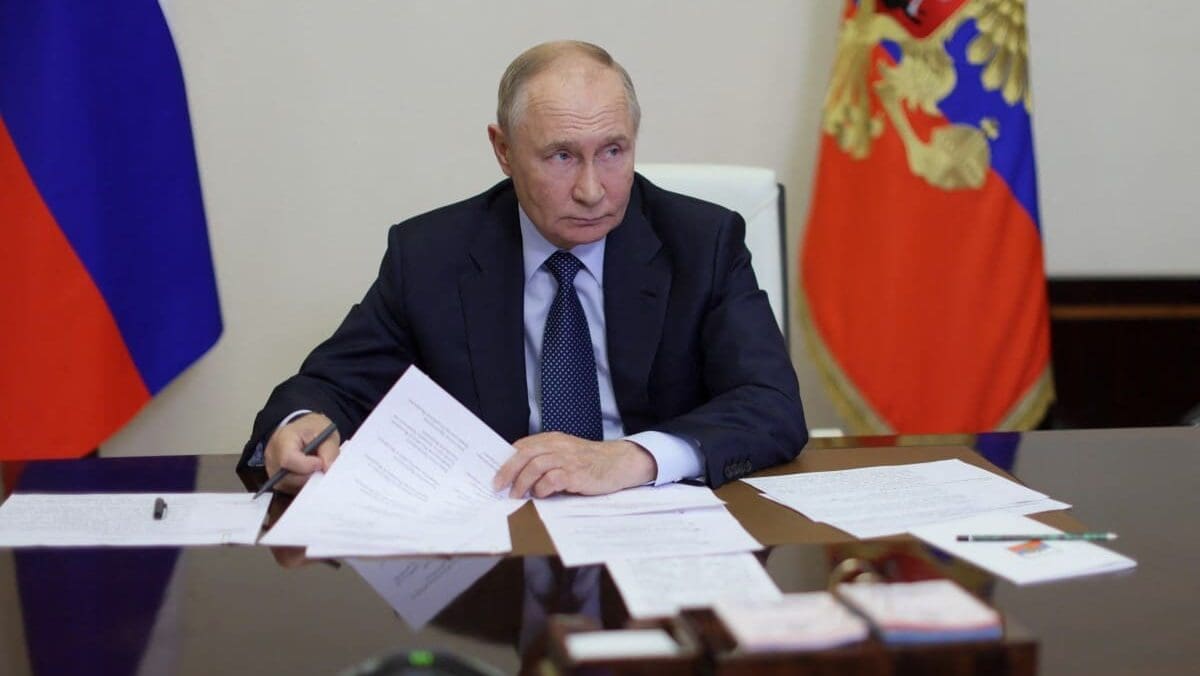
President Vladimir Putin chairs a meeting on situation in Belgorod, Kursk ,and Bryansk regions following an invasion of Ukrainian troops in the course of Russia-Ukraine conflict, via video link at the Novo-Ogaryovo residence outside Moscow on August 22, 2024.
Photo: Gavriil GRIGOROV / POOL / AFP
Russia’s leadership is trying to spin the recent Ukrainian incursion into Russian territory as the “new normal,” a situation the country should not worry about, according to a report by Kremlin-critical Russian website Meduza, whose offices are in Latvia.
The news outlet spoke to sources close to the Putin administration and the government, and concluded that the Russian political elite was initially shocked by Ukrainian forces entering Russia, with one source saying that their “very entry into Russian territory and seizing control of villages is a new and very unpleasant event.”
Ukraine, which has been defending its own territory since the invasion of Russia two and a half years ago, launched a surprise incursion into the Russian region of Kursk, a lightly defended border area, on August 6th. Kyiv claims it has since captured 1,250 square kilometres of Russian territory, and 93 settlements. It took hundreds of prisoners captive and forced the evacuation of tens of thousands of civilians.
“The [Russian] reaction has been unsurprisingly somewhat chaotic. You’ve got a mix of border guards, national guard, FSB and regular army and local authorities, and it’s not clear who’s responsible,” said retired U.S. Army officer, Lieutenant-General Ben Hodges.
“Russia seems to do quite poorly when it has to respond dynamically in a situation like this. Russian forces do far better when they’re operating with prepared defence, fixed lines, more on positional warfare,” said military analyst Michael Kofman of the Carnegie Endowment.
By pulling in reinforcements, Russia has been able to slow down, but not stop the enemy’s advance.
According to Meduza, a Kremlin-commissioned poll conducted after the attack showed that the share of Russians who believe an “anxious mood” is predominant in their social circles grew by six points to 45%. However, more than two weeks have passed since the beginning of the incursion, and the Russian propaganda machine is slowly adapting to the situation.
Russia’s elites could be hoping that Putin’s reaction to the events in Kursk fits a pattern in which he is initially slow to respond to a crisis before eventually managing to prevail, analysts told AP.
The Kremlin’s aim is to create calm, and make Russians aware of a “new reality.” The core message of the leadership is that the enemy really did penetrate Russian territory, but inevitable defeat awaits them. However, returning territory takes time, and Russians will need to wait. Military experts have said it could take months to drive out Ukrainian forces.
During this time, writes Meduza, residents are urged to “channel the negativity and shock in a positive direction”—namely to help collect aid for the Kursk region.
Russia has also decided not to cancel the upcoming gubernatorial election in the Kursk region, because “canceling would increase panic, it would mean the entire region is under threat,” a source told Meduza. However, the electoral commission will postpone local elections in seven municipalities in the region, saying the votes would take place once there was “a full guarantee of the security of voters.”
Another dilemma for Moscow is how to repel the attack as it struggles to find suitable forces. In order to avoid having to divert troops away from the Donbas, the Ukrainian territory under Russian invasion, the Kremlin may look to deploy reserves and conscripts, something it was not intent on doing in fear of angering Russian locals.
On the other hand, the incursion has boosted morale in Ukraine which has been suffering setbacks on the battlefields in Donbas, where Russian troops are advancing forward. The offensive represents “a victory that we have not had for a long time,” said Roman Kostenko, a lawmaker and officer in Ukraine’s security service, who has participated in the operation.
